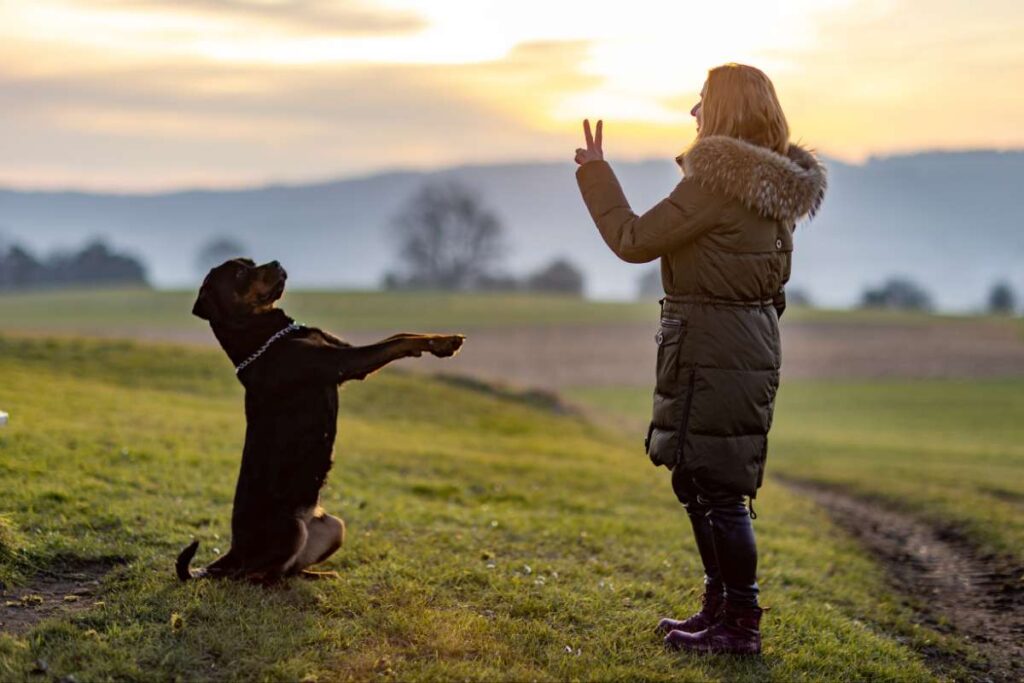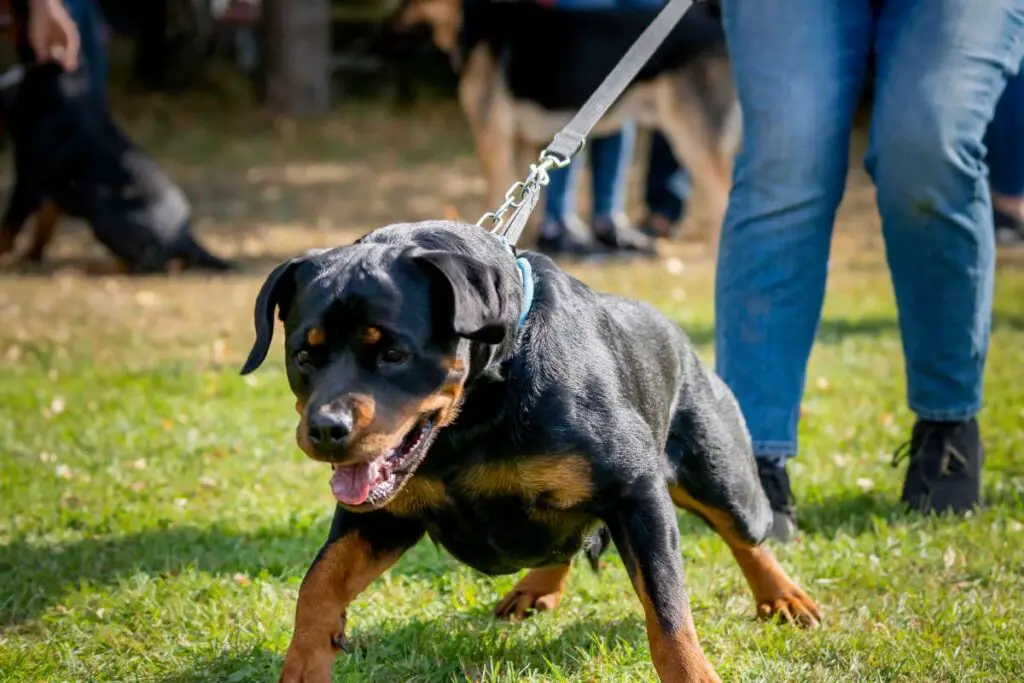Rottweilers are awesome dogs – super smart, super strong, and super loyal. But, they also need to be handled with care. Just like with any dog, there are some things you should never do with your Rottweiler. Let’s get right into it!
1. Don’t Skip Training

Training is not just about teaching your Rottweiler cool tricks, it’s about setting boundaries and teaching them how to behave. Rottweilers are naturally intelligent and eager to learn, so training can be a great way to bond with them and stimulate their minds.
Start with basic commands like “sit,” “stay,” “come,” and “leave it.” As they get older, you can teach more complex commands. Consistency is key, so make sure you’re reinforcing these commands daily. Remember, a well-trained Rottweiler is not only a joy to be around but also safer to interact with for other people and animals.
2. Never Neglect Socialization

Socialization is an essential part of any dog’s upbringing, especially for Rottweilers. Because of their natural wariness around strangers, early socialization is key to help them grow up to be well-rounded dogs.
Start socializing your Rottweiler puppy as soon as it’s safe to do so. Introduce them to a wide range of experiences – different types of people, other animals, various environments. Take them to puppy classes, invite people over to your house, go on walks in different neighborhoods, expose them to different sounds and sights.
The goal is to get your Rottweiler comfortable with new experiences so they won’t react aggressively or fearfully. Keep these encounters positive and never force your dog into a situation they’re uncomfortable with. Slow and steady wins the race when it comes to socialization.
3. Don’t Let Them Pull on the Leash

Teaching your Rottweiler not to pull on the leash is crucial. First of all, it’s important because these dogs are strong – like, really strong – and if they decide they want to go after something while on a walk, you need to be sure you can keep control.
Secondly, a dog pulling on the leash is a dog that’s leading the walk, not you. This can confuse the balance of who’s in charge, making it harder for your dog to listen to other commands. Plus, pulling on the leash can actually be dangerous for your dog, potentially causing harm to their neck or throat.
Start leash training as early as possible, rewarding your pup when they stay by your side and keep a slack leash.
4. Avoid Leaving Them Alone for Long Periods

Rottweilers, like many dog breeds, are social animals. They thrive on interaction with their families and don’t do well when left alone for extended periods. Loneliness and boredom can lead to unwanted behaviors like chewing on furniture or excessive barking.
If you have to leave your dog alone for a few hours, make sure they have plenty of toys to keep them occupied. If you work long hours, consider getting a dog walker or sending your Rottweiler to doggy daycare.
Remember, these dogs need mental stimulation just as much as they need physical exercise. Keep them engaged with puzzle toys or hide-and-seek games with treats around the house. Every dog’s tolerance for being alone will vary, but as a rule, try to minimize their alone time as much as possible.
5. Never Ignore Their Exercise Needs

Rottweilers are a high-energy breed. They were originally bred to herd livestock and pull carts, so they’re used to having a job to do. If they don’t get enough exercise, they can get bored, and a bored Rottweiler can quickly turn into a destructive one.
Aim for at least an hour of exercise per day, but remember this doesn’t have to be all in one go. A walk in the morning, a play session in the afternoon, and maybe a shorter walk in the evening can be a good schedule.
Mental exercise is just as important as physical exercise, so games that make them think, like fetch or hide and seek, are great options.
6. Don’t Overfeed Them

Rottweilers love food, and they can be prone to weight gain if not carefully monitored. Overweight dogs are at risk of many health problems, like diabetes, heart disease, and joint problems, so it’s essential to keep an eye on their weight.
Try to feed them a balanced diet, and avoid giving them too many treats or human food. Remember that the amount of food a dog needs can depend on their size, age, and activity level, so what’s right for one Rottweiler might not be right for another.
7. Never Neglect Regular Vet Check-ups

Regular vet check-ups are super important for keeping your Rottweiler healthy. Rottweilers are prone to certain health problems, like hip dysplasia, eye diseases, and heart conditions.
Regular vet visits can help catch any potential problems early, when they’re usually easier to treat. Your vet can also give you advice on diet and exercise, and keep your dog up to date with vaccinations and parasite treatments.
It’s a good idea to have your vet’s number saved in your phone, so you can quickly reach them if you have any concerns.
8. Avoid Being Inconsistent With Rules

When it comes to setting rules for your Rottweiler, consistency is absolutely key. Inconsistency can be confusing for your dog and can lead to behavior issues.
For instance, if you let your Rottweiler sit on the couch one day, but scold them for it the next day, they won’t understand what they did wrong. To avoid confusion, decide on the house rules and make sure everyone sticks to them.
This includes everyone in the house – yes, that means kids and guests too! When everyone’s on the same page, it’s much easier for your Rottweiler to understand what’s expected of them.
9. Never Use Physical Punishment

This one is super important. Physical punishment is not only cruel, but it’s also ineffective and can lead to aggression.
Instead, use positive reinforcement techniques to train your Rottweiler. This means rewarding the behaviors you want to see and ignoring the ones you don’t. For example, if your Rottweiler sits calmly when a visitor arrives, give them a treat or praise.
If they jump up, ignore them until they calm down. This way, your Rottweiler learns that good behavior leads to rewards. Remember, the goal of training is to build a strong bond with your dog based on mutual respect and understanding, not fear.
And that’s it! However, every dog is unique, so what works for one Rottweiler might not work for another. But these tips should give you a good starting point. Happy dog parenting!





